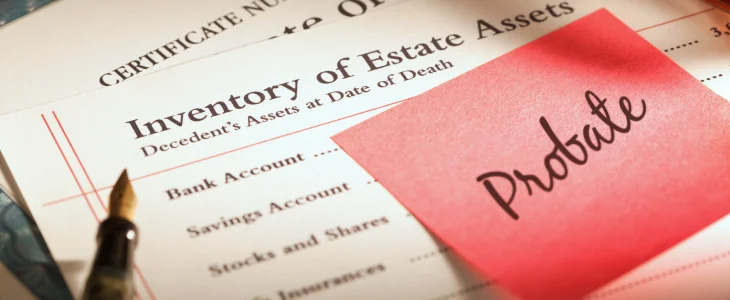Probate proceedings in Massachusetts are governed by the Massachusetts Uniform Probate Code or MUPC. If there is real estate in the decedent’s estate, the Will may have designated that the property go to a certain heir or other beneficiary, or that the property be sold and the assets distributed equally or in whatever shares the decedent intended.
A decedent may have a Will wherein a personal representative (formerly called Executor) of the estate is designated. If there is no Will, the decedent is deemed intestate and the court will appoint a personal representative, usually a close relative, to administer the estate. In all cases, the probate process must begin within 3 years of the decedent’s date of death.
Massachusetts has a simplified procedure for estates valued at no more than $25,000.00 if the entire estate, less liens and encumbrances, does not exceed the combined value of exempt property, the family allowance, funeral expenses, last illness expenses and the costs of probate.
There is also a formal and an informal probate process. Formal is used if the heirs are disputing the property or distribution of assets, or have other issues. Actions by the personal representative are approved by the judge. Informal probate is conducted by a magistrate with little oversight over the personal representative who will eventually file a sworn statement attesting that the taxes and debts have been paid and property distributed to the heirs in accordance with the Will or the laws of intestacy, (State Statutes) if applicable.
In most cases it is best to use the Formal process for selling real estate in probate.
Power of the Personal Representative to Sell Real Estate
The personal representative may sell real estate by petitioning the court for a “License to Sell”, if the Will does not waive this requirement. Even if the Will does waive this requirement, it may be wise to petition the Court for a License to Sell if there are disagreements amongst the heirs. A Petition for a License to Sell allows everyone the opportunity to be heard, grievances to be aired, and protects the Personal Representative from possible personal liability if something goes wrong, by getting that “stamp” of approval from a Judge.
Buyers of Real Estate in Probate
Buyers must be aware that the Personal Representative has a fiduciary obligation under statutory law to get the highest possible price on the sale of the real estate for the heirs of the estate. Not all real estate agents and not all real estate lawyers will admit to being unfamiliar with the probate process when it comes to selling real estate in a decedent’s estate. It is wise to only hire a real estate broker and a real estate lawyer who is very familiar with the selling of real estate in the probate process. Because, if a better price is offered to the Personal Representative and he/she receives a bona fide offer from a Third Party to purchase the real estate for a purchase price higher than the first offer, it must be considered. In the event the Personal Representative receives a bona fide subsequent offer and the first Buyer cannot or will not match the new offer amount, all deposits made by the first Buyer should promptly be refunded. Thereafter, all obligations of the Personal Representative and the first Buyer would be voided, without recourse to the parties.
Notwithstanding the foregoing, in the event the Personal Representative receives such an additional bona fide offer to purchase the real estate, he/she should immediately notify the first Buyer in writing of the terms and conditions of said bona fide offer and also forward a name-redacted copy of such bona fide offer to the first Buyer. The first Buyer should then have five (5) business days after receipt of notice of such subsequent bona fide offer to agree, by written notice to the Personal Representative, to purchase the Property under the same terms and conditions of such subsequent bona fide offer.
Applying for the License
When applying for the License to Sell real estate, the Personal Representative must have a signed Purchase and Sales Agreement from a buyer. The purchase price forms the basis for the real estate license to be issued. If the price is modified afterwards, the personal representative must petition the court for another license. Licenses are for a fixed period of time.
When applying, the Personal Representative must do the following:
- Submit the signed purchase and sales agreement; and
- Provide an inventory of all the estate’s assets and obtain approval of the heirs; and
- Include the terms of the sale, sale price, and description of the property.
The Personal Representative’s obligation to sell at the sales price should have language in the Purchase and Sales Agreement whereby it is contingent upon the Personal Representative obtaining the License to Sell from the court at the absolute highest price possible; that the Personal Representative’s License to Sell granted by the Court is still in effect as of the date of closing and that no higher or better offer comes in before conveyance of the real estate. This can protect the Personal Representative in the event a higher offer does comes in so that the Personal Representative can consider the better offer without risk of being sued by the original buyer, or the heirs at law.
Consult Real Estate Lawyer Patricia Bloom-McDonald
When selling a home in probate, consult and retain someone with experience in such matters. Patricia Bloom-McDonald has been in the legal field and advocates for the elderly in real estate, estate planning and probate matters. She has been representing the interests of the elderly and their families throughout the Commonwealth for over 25 years. Your initial one-hour consultation is always complimentary. You can reach her at 508-646-9888 or 781-713-4709 or through her website at www.McBloomLaw.com.

